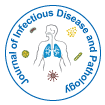Unsere Gruppe organisiert über 3000 globale Konferenzreihen Jährliche Veranstaltungen in den USA, Europa und anderen Ländern. Asien mit Unterstützung von 1000 weiteren wissenschaftlichen Gesellschaften und veröffentlicht über 700 Open Access Zeitschriften, die über 50.000 bedeutende Persönlichkeiten und renommierte Wissenschaftler als Redaktionsmitglieder enthalten.
Open-Access-Zeitschriften gewinnen mehr Leser und Zitierungen
700 Zeitschriften und 15.000.000 Leser Jede Zeitschrift erhält mehr als 25.000 Leser
Indiziert in
- Google Scholar
- RefSeek
- Hamdard-Universität
- EBSCO AZ
- ICMJE
Nützliche Links
Open-Access-Zeitschriften
Teile diese Seite
Abstrakt
Assessment of Knowledge, Attitude and Practice on Louse Infestation and Associated Factors, among Prisoners of Jimma Town Prison South Western Ethiopia
Xtiana Daniel
Background: Louse infestation is the poor personal hygiene and a blood feeding ectoparasitic insect of order ptrithirapetera. Inadequate access of water supply leads people to acquire communicable disease such as typhus and relapsing fever. Head lice cause much distress and worry in families with school-aged children. There are many available treatment options. Many of these options are costly and may not be effective.
Objective: To assess the knowledge, attitude and practice of louse infestation versus disease transmission among prisoners of Jimma town prison at Jimma town from Jan, 2021 GC.
Methodology: Cross-sectional study was conducted in Jimma prison at Jimma town from Jan, 2021 GC. The data was collected using pretested questionnaires interview with translating the questionnaires to local language and observation. Three hundred twenty eight prisoners were enrolled through simple random sampling techniques.
Results: All prepared questions were asked to measure the knowledge, attitude and practice of respondents about louse infestation and related disease. Accordingly; 243 (74.1%) were found to have good knowledge and 15(4.6%) had poor knowledge. By attitude, it was found that, 223(68%) had positive attitude while 105(32%) had negative attitude from those who are asked to response. On the other hand, 236(72%) of respondents were have good practices and 92(28%) were had poor practices.
Conclusion: The level of louse infection prevention practice in our study area was low. Therefore, responsible stakeholders including Zonal health departments, Woreda health offices and extension workers should work on enabling factors specially focusing on prison hygiene and related factors.
Zeitschriften nach Themen
- Allgemeine Wissenschaft
- Biochemie
- Chemie
- Genetik und Molekularbiologie
- Geologie und Geowissenschaften
- Immunologie und Mikrobiologie
- Klinische Wissenschaften
- Krankenpflege und Gesundheitsfürsorge
- Landwirtschaft und Aquakultur
- Lebensmittel & Ernährung
- Maschinenbau
- Materialwissenschaften
- Medizinische Wissenschaften
- Pharmazeutische Wissenschaften
- Physik
- Sozial- und Politikwissenschaften
- Umweltwissenschaften
- Veterinärwissenschaften
Klinische und medizinische Fachzeitschriften
- Anästhesiologie
- Augenheilkunde
- Betrieb
- Dermatologie
- Diabetes und Endokrinologie
- Gastroenterologie
- Genetik
- Gesundheitspflege
- Immunologie
- Infektionskrankheiten
- Kardiologie
- Klinische Forschung
- Medizin
- Mikrobiologie
- Molekularbiologie
- Neurologie
- Onkologie
- Pädiatrie
- Pathologie
- Pflege
- Toxikologie
- Zahnheilkunde

 English
English  Spanish
Spanish  Chinese
Chinese  Russian
Russian  French
French  Japanese
Japanese  Portuguese
Portuguese  Hindi
Hindi